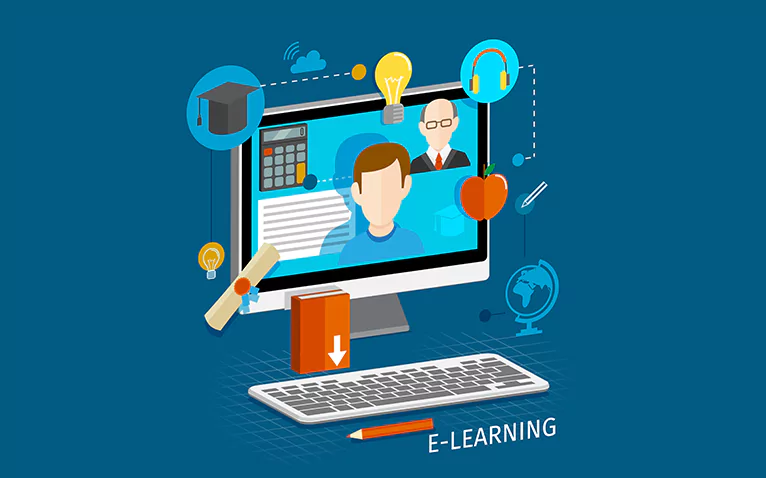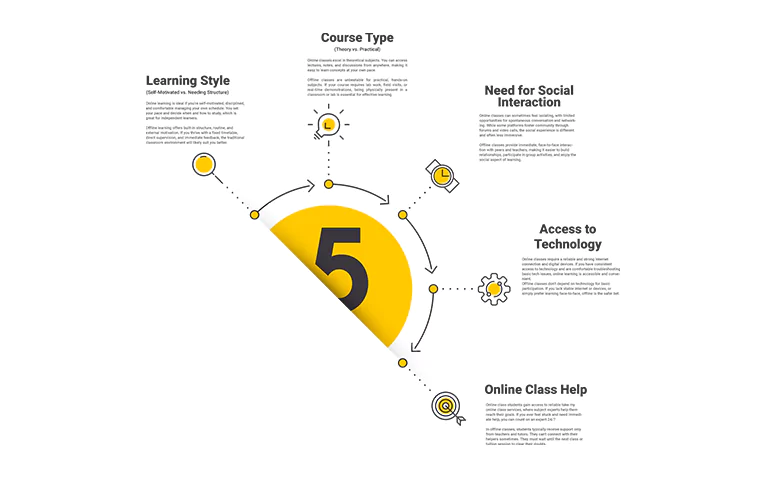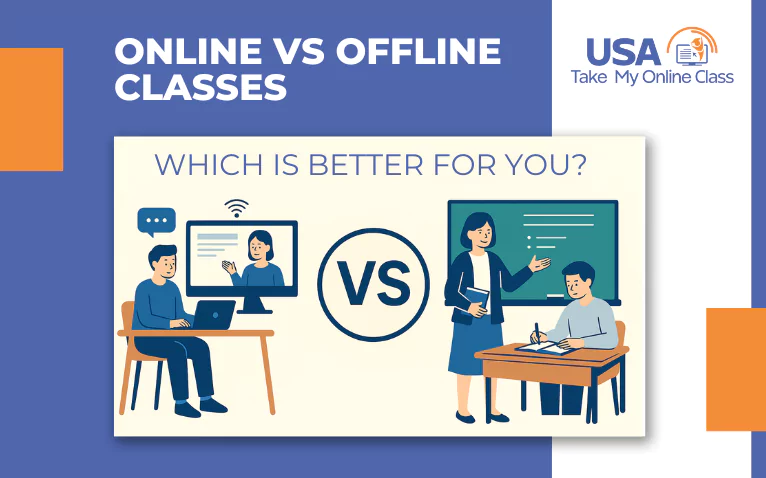Imagine waking up and attending your class in your pajamas, sipping mocha or coffee from your favorite mug, all without stepping outside your door. Now, picture the buzz of a lively classroom- the energy of face-to-face debates, the instant feedback from your teacher, and the camaraderie of friends sitting right beside you.
Welcome to the world of education today, where online and in-person classes are competing for your attention. But why do Online vs. offline Classes matter now more than ever?
The way we learn is changing faster than ever before. The changing learning environment didn’t disrupt schools; they revolutionized them! The emerging trends in technology have prompted millions to move into virtual classrooms. Suddenly, what once seemed like a futuristic option became the new normal. But is online learning really better? Or does the traditional classroom still hold the secret to success?
The truth is that both online and offline classes have their own perks and pitfalls. The real question isn’t which one is universally better, but which one fits you best. So, buckle up as we dive into this exciting showdown and help you uncover the perfect learning style for your unique journey.
What are Online Vs Offline Classes?
Think of online classes as your gateway to a global classroom- no walls, no borders, just endless possibilities streaming to your screen. Whether it’s a live Zoom lecture, a pre-recorded tutorial, or an interactive app, an online learning experience lets you study anytime, anywhere.
Got a Wi-Fi connection and a device? You’re ready to dive into your online course. It’s education on your terms, tailored to your pace and style.
Now, flip the coin. Offline classes are the classic school experience! The buzz of chatter before class starts, the feel of a textbook in your hands, and the instant eye contact with a teacher who’s right there to guide you. It’s about being present, soaking in the atmosphere, and learning through real-time discussions and hands-on activities. The classroom isn’t just a place; it’s a community.
Both worlds offer unique vibes and experiences. One thrives on flexibility and technology, the other on tradition and direct connection. Ready to see how they stack up? Let’s dig deeper.
Key Difference Between Online and Offline Classes for Students
Let’s break it down and see how offline versus online learning worlds compare. Here’s the lowdown on what separates them and what that means for you.
| Factor | Online Classes | Offline Classes |
|---|---|---|
| Flexibility | Your classroom is wherever you want it to be: the couch, a café, or even a beach (if the Wi-Fi holds up!). Allows students to learn at their own pace and at their speed. | The clock rules here. Classes take place at set times and locations, so you need to show up ready to go. |
| Interaction | Chat boxes, video calls, and discussion boards keep you connected, but it’s not quite the same as sharing a laugh or debating face-to-face. | Instant reactions, group projects, and those spontaneous hallway chats make learning a social and dynamic experience. |
| Cost | Generally lighter on the wallet, no commuting, fewer materials, and often more affordable tuition. | Think bus fares, printed textbooks, and sometimes pricier fees for campus facilities. |
| Technology Need | You’re the tech boss here. A reliable device and the internet are your best friends. | Minimal tech needed, just bring your notebook and enthusiasm. |
| Practical Learning | Great for theory and digital simulations, but mastering practical skills can be challenging remotely. | Labs, workshops, and real-world practice sessions make it easier to get hands-on experience. |
| Social Skills | Networking mostly happens online, which can be great, but sometimes it can be a bit lonely. | The buzz of campus life, clubs, and face-to-face friendships enrich your experience. |
| Course Variety | The world is your classroom, thanks to global access. | Here, you will be limited to the institution’s offerings only. |
| Discipline Needed | You’re the captain of your ship. Without a fixed schedule, self-motivation is key. | The structure is built in, helping keep you on track. |
Pros and Cons of Online Education and Offline Education
No learning style is perfect and has its own unique strengths and weaknesses. Let’s pull back the curtain and see what really happens behind the scenes of offline and online classes.
Online Classes

Teachers in online classes may find it challenging to engage students as effectively as they do in offline classes. This form of learning, whether in person or online, has its own merits. While offline education is less flexible, it can be more engaging for students who need direct support. Students who are unable to attend in person may prefer online classes, although online options may lack the personal touch that comes with both online and offline learning.
Let’s talk about the benefits of online classes (also the disadvantages of online classes!)
Superpowers:
- Ultimate Flexibility: Willing to study in your PJs, on your schedule, from anywhere in the world? Online classes allow you to do classes from anywhere!
- Wider Choices: From coding to cooking, access courses and teachers from across the globe, making your online learning environment the world!
- Cost Savvy: Online classes provide cost-effective solutions as you can save on commuting, accommodation, and sometimes even tuition.
- Tech Skills: The rise of online classes has made people comfortable with digital tools, an essential skill for today’s world.
- Self-Paced Learning: The greatest advantage of online classes is that you can go at your own pace, repeat lessons, and learn at your own rhythm.
Secret Weaknesses:
- Distractions Galore: The drawbacks of online studies include social media, snacks, or your bed, which can easily steal your focus.
- Less Social Buzz: Online education has become a barrier to making friends or feeling part of a community, as it is harder.
- Tech Troubles: Online classes rely on the internet, so issues with the internet or computer glitches can disrupt learning.
- Motivation Needed: In an online classroom, no one’s watching over your shoulder; you must keep yourself on track.
- Limited Hands-On Practice: Some skills are better learned face-to-face, and online reading materials may not suffice.
To explore the difference between online and offline learning, you also need to know about the advantages of offline classes!
Offline Classes

It’s time to explore the benefits of offline classes, the traditional counterpart to online degrees (they, too, have negative sides!)
Offline courses and offline classes offer a structured environment where classes are less likely to be missed, and unlike online options, students are less likely to feel isolated since classes are held in person. One of the greatest advantages of offline study is that students are required to attend class in person, which helps maintain discipline.
Let’s learn more:
Superpowers:
- Instant Interaction: In traditional classroom learning, you can ask questions, join discussions, and receive feedback in real-time.
- Hands-On Learning Experience: Students can attend classes Face-to-face. Also, help students by offering Labs, workshops, and group activities.
- Structured Routine: Offline classes provide a stimulating environment with proper schedules and deadlines to keep you organized.
- Social Life: In traditional learning, you can make friends, join clubs, and take advantage of campus events.
- Focused Environment: Offline settings and the education industry have fewer distractions, leading to more learning.
Secret Weaknesses:
- Less Flexibility: In a traditional offline class, you have to stick to a set schedule and location.
- Higher Costs: You cannot access classes from anywhere; you must consider travel, accommodation, and sometimes higher fees.
- Limited Course Variety: Offline classes provide students fewer choices, depending on what your school or college provides.
- Commute Hassles: Traffic jams and long rides can eat up your time and energy.
- Not for Everyone: Some people thrive in a self-paced, independent environment.
Now that you have got all the information about online vs offline education, which side are you leaning toward? Before you decide, let’s talk about how to pick what’s best for you.
Which is Better Online Classes Vs Offline Classes?

If you’re still in a pickle thinking how to choose between online and offline classes, then here’s what you need to know:
Learning Style (Self-Motivated vs. Needing Structure)
- Online learning is ideal if you’re self-motivated, disciplined, and comfortable managing your own schedule. You set your pace and decide when and how to study, which is great for independent learners.
- Offline learning offers built-in structure, routine, and external motivation. If you thrive with a fixed timetable, direct supervision, and immediate feedback, the traditional classroom environment will likely suit you better.
Course Type (Theory vs. Practical)
- Online classes excel in theoretical subjects. You can access lectures, notes, and discussions from anywhere, making it easy to learn concepts at your own pace.
- Offline classes are unbeatable for practical, hands-on subjects. If your course requires lab work, field visits, or real-time demonstrations, being physically present in a classroom or lab is essential for effective learning.
Need for Social Interaction
- Online classes can sometimes feel isolating, with limited opportunities for spontaneous conversation and networking. While some platforms foster community through forums and video calls, the social experience is different and often less immersive.
- Immediate, face-to-face interaction in traditional style with peers and teachers makes it easier to build relationships, participate in group activities, and enjoy the social aspect of learning.
Access to Technology
- Online classes require a reliable and strong internet connection and digital devices. If you have consistent access to technology and are comfortable troubleshooting basic tech issues, online learning is accessible and convenient.
- Offline classes don’t depend on technology for basic participation. If you lack stable internet or devices, or simply prefer learning face-to-face, offline is the safer bet.
Online Class Help
- Online class students gain access to reliable take my online class services, where subject experts help them reach their goals. If you ever feel stuck and need immediate help, you can count on an expert 24/7.
- In offline classes, students typically receive support only from teachers and tutors. They can’t connect with their helpers sometimes. They must wait until the next class or tuition session to clear their doubts.
Furthermore, if you wish to know “How Can Hiring an Online Class Expert Reduce Stress and Save Time,” this blog is for you!
Parting Thought
When it comes to online or offline education, many students wonder which classes offer the best experience. One is better depending on individual needs, but compared to offline classes, the pace of learning in online classes can be more flexible, though it may also be more challenging for students who struggle with self-motivation.
Many students find that classes online offer flexibility and convenience, allowing them to learn from anywhere. Whereas in offline settings, classes involve more direct interaction with teachers and peers, which can enhance understanding and engagement. When it comes to offline learning, some argue that offline is better for building discipline and social skills, as classes are conducted in a structured environment that encourages participation and focus.
While all this may seem too much, here’s something you must realize. The art of studying is subjective. It is a very personal experience. Therefore, you must find your calling. We might list a thousand advantages of online classes, yet it might not work for you. Similarly, we can say face-to-face classes benefits introverts, yet most would choose online classes because they love their own privacy and companionship.
In a nutshell, it all comes down to your choice and preference!

